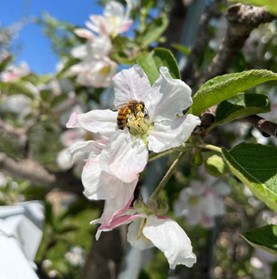Ontario Offers Financial Aid For Beekeepers
Alan Harman
Ontario’s provincial government announces a one-off aid package for beekeepers in the Canadian province hit by harsh winter conditions this year and other pollinator health issues.
Saying the province’s bee colonies are expected to experience higher than normal mortality rates, it is providing one-time financial assistance of C$105 (US$95.70) a hive to beekeepers who have 10 hives or more and lose more than 40% of their colonies between Jan. 1 and Oct. 31, 2014.
“Registered beekeepers representing over 90% of the hives in Ontario and the majority of pollination services offered by the industry will benefit from the program,” the government says in a statement.
The province is also exploring options to provide bee mortality insurance over the longer term and has committed C$1.2 million (US$1.09 million) toward researching factors that affect bee health and related best management practices in field crop production.
Ontario Premier and Minister of Agriculture and Food Kathleen Wynne says the government recognizes the critical role pollinators and beekeepers play in maintaining a healthy environment and productive agri-food sector.
“We want to keep honey bee colonies strong going into the growing season while we continue working with the industry to support long-term sustainability for beekeepers and the health of all pollinators,” she says.
Saugeen Country Honey owner David Schuit called the government program a slap in the face.
Schuit told the Guelph Mercury newspaper that buying and populating a hive costs about C$350 (US$319), so the compensation is just one-third of the value and is hardly enough to rejuvenate bee populations.
“It’s not going to help at all,” he says.
Schuit says the funding is a waste of public funds, since it does nothing to address the issue of what is actually killing bees.
“If they would ban the neonicotinoids and didn’t give us any funding, we would survive,” he says.
But Ontario Beekeepers’ Association president Dan Davidson says he is pleased the Ontario government has taken a first step toward helping beekeepers.
“While the compensation plan doesn’t solve the problem, it will help mitigate losses that Ontario beekeepers have suffered from the harsh winter and the inappropriate use of neonicotinoid pesticides,” Davidson says.
“We look forward to working together to expedite a sustainable solution that addresses current threats to bee health.”
Some 3,000 registered beekeepers manage about 100,000 honey bee colonies in Ontario and honey production contributes C$26 million (US$23.7 million) to the province’s economy. The bees play an essential role in the pollination of an estimated C$170 million (US$155 million) of horticulture and field.








